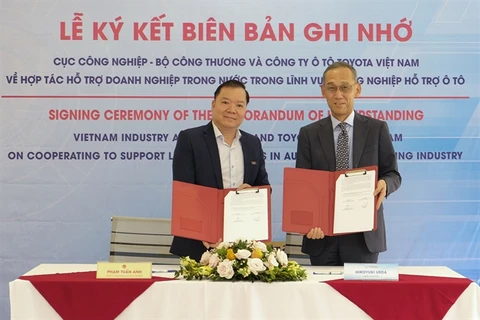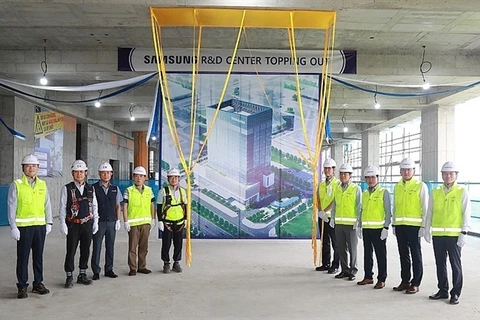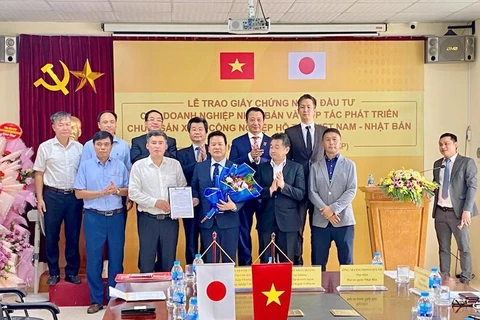Hanoi (VNA) – Hanoi’s firms operating in the supporting industry are developing strongly, reflected through the continuous increases in the number of businesses, their scale and quality. However, according to economists, the capital city still needs specific policies to make the sector grow further.
Hanoi has rolled out many solutions to develop the industry, aiming to increase its development index.
Accordingly, municipal authorities will connect and support enterprises in the field to become component suppliers for domestic and foreign enterprises.
The city will attract foreign investment to this field and support the enterprises in applying management systems under the requirements of global production chains.
It will also support them in the research, development, application, transfer and innovation of technology in producing components, spare parts and materials.
In addition, the city will build an information system and disclose information about the annual development of the supporting industry.
According to experts, the industry play an extremely important role in the national industrial development, because the supply of materials, spare parts, and semi-finished takes place domestically to ensure the initiative for the industrial sectors, and avoid dependence on imports and fluctuations of the global economy.
The growth of the supporting industry contributes to exploiting resources well, reducing imports, and limiting the export of resources and semi-processed products. Its development increases the value added of industrial products and the ability to attract foreign direct investment, as well as establishes a system of small and medium enterprises,
Therefore, they expect that in the coming time, the Government will submit to the National Assembly for promulgation the Law on Industrial Development which contains specific policies for the supporting industry to promote the development of Vietnamese enterprises.
These policies can help them gain access to capital, science and technology, international trade, or participate in annual fairs and boost trade promotion through both online and offline channels.
Dr. Pham Xuan Khanh from the Hanoi Vocational College of High Technology, said currently, the competitiveness of Vietnamese youth when participating in the regional and international labour market is still limited. Vietnam's trained human resources are mainly in the processing and assembly stage of the production and business chain, while the number of highly qualified employees remains modest, he added.
In order to train the workforce to meet the demand of the labour market in the new situation, Khanh recommended that Vietnam standardise and develop the quality of teachers and administrators, renew training according to the smart school model, improve the quality of admissions, and strengthen the connection between training and businesses.
Vietnam's supporting industry, which remained underdeveloped and overly reliant on imports, has been identified as a major weakness for the country, especially in key industries such as electronics, textile, leather and footwear, manufacturing, and automobile.
Hanoi capital city has around 900 enterprises involved in supporting industries, of which nearly 300 have products meeting international standards. Most of them produce components and spare part, products serving garment-textile and footwear manufacturing, and those serving the high-tech industry. A significant number of firms boasts production systems and products meeting international standards, which makes them capable of joining the global supply chains of multinational conglomerates.
According to the programme on developing the supporting industry of Hanoi this year, the capital aims to have about 920 enterprises in the field, including 300 with qualified production systems and quality products supplying to the global production network of multinational corporations in Vietnam.
The capital city expects to start construction of all the 43 industrial clusters this year, providing thousands of hectares for enterprises to expand production in the next two years./.
Hanoi has rolled out many solutions to develop the industry, aiming to increase its development index.
Accordingly, municipal authorities will connect and support enterprises in the field to become component suppliers for domestic and foreign enterprises.
The city will attract foreign investment to this field and support the enterprises in applying management systems under the requirements of global production chains.
It will also support them in the research, development, application, transfer and innovation of technology in producing components, spare parts and materials.
In addition, the city will build an information system and disclose information about the annual development of the supporting industry.
According to experts, the industry play an extremely important role in the national industrial development, because the supply of materials, spare parts, and semi-finished takes place domestically to ensure the initiative for the industrial sectors, and avoid dependence on imports and fluctuations of the global economy.
The growth of the supporting industry contributes to exploiting resources well, reducing imports, and limiting the export of resources and semi-processed products. Its development increases the value added of industrial products and the ability to attract foreign direct investment, as well as establishes a system of small and medium enterprises,
Therefore, they expect that in the coming time, the Government will submit to the National Assembly for promulgation the Law on Industrial Development which contains specific policies for the supporting industry to promote the development of Vietnamese enterprises.
These policies can help them gain access to capital, science and technology, international trade, or participate in annual fairs and boost trade promotion through both online and offline channels.
Dr. Pham Xuan Khanh from the Hanoi Vocational College of High Technology, said currently, the competitiveness of Vietnamese youth when participating in the regional and international labour market is still limited. Vietnam's trained human resources are mainly in the processing and assembly stage of the production and business chain, while the number of highly qualified employees remains modest, he added.
In order to train the workforce to meet the demand of the labour market in the new situation, Khanh recommended that Vietnam standardise and develop the quality of teachers and administrators, renew training according to the smart school model, improve the quality of admissions, and strengthen the connection between training and businesses.
Vietnam's supporting industry, which remained underdeveloped and overly reliant on imports, has been identified as a major weakness for the country, especially in key industries such as electronics, textile, leather and footwear, manufacturing, and automobile.
Hanoi capital city has around 900 enterprises involved in supporting industries, of which nearly 300 have products meeting international standards. Most of them produce components and spare part, products serving garment-textile and footwear manufacturing, and those serving the high-tech industry. A significant number of firms boasts production systems and products meeting international standards, which makes them capable of joining the global supply chains of multinational conglomerates.
According to the programme on developing the supporting industry of Hanoi this year, the capital aims to have about 920 enterprises in the field, including 300 with qualified production systems and quality products supplying to the global production network of multinational corporations in Vietnam.
The capital city expects to start construction of all the 43 industrial clusters this year, providing thousands of hectares for enterprises to expand production in the next two years./.
VNA

























